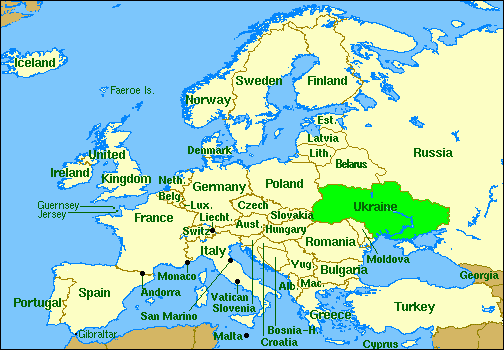Earlier this month, the World Affairs Council of West Michigan hosted Dr. Matthew Rojansky, of the Woodrow Wilson International Center for Scholars and an expert on U.S. relations with the states of the former Soviet Union, especially Russia, Ukraine, Belarus and Moldova, to speak on the crisis still brewing in Ukraine and what that means for the rest of Europe, the US, and the world. A spark was lit in Ukraine after an over-the-top reaction by the government to the mostly peaceful protests that broke out in Kiev in late 2013, but trouble had been percolating for years, as Ukraine lies torn between an inviting European Union to its west and a corrupt, complex post-Soviet legacy to its east.
(For an example of the excesses of the regime of former president Viktor Yanukovych, just look at his palace.)


The crisis began the evening of November 21st, 2013, in what is now known as the Euromaidan, which means, literally, "Euro Square". The mass demonstrations demanded closer European integration, and eventually, after the brutal reaction to the unrest by police and Yanukovych’s regime, the resignation of the president and the election of a new government. The protest became politicized and radicalized by the gross mistreatment of the protestors, which included snipers high above Kiev firing down upon unsuspecting protestors, and a so-called “anti-Bill of Rights” pushed through by Yanukovych combined with a full-fledged “Battle for the Maidan” in mid-February 2014 solidified the revolution.
At this point, Putin and Russia began to lick their chops at the prospect of regaining territory in the already heavily pro-Russian regions of southeast Ukraine, including the Crimean peninsula. His thinly disguised support for pro-Russian rebels (who ‘aren’t Russian but only happen to wear Russian uniforms…maybe there was a very large wholesale discount at a local supply store), coupled with the shooting down of Malaysia Air flight MH17 brought international attention to a crisis that had been boiling over for months.
Why didn’t the Malaysia Air flight avoid flying over the war-torn region? Well, Ukraine is big. Really big. Which makes the geopolitics of this conflict inescapable.
So what is Putin’s endgame?
Domestic politics. He's worried that this could potentially happen in Russia? The situation is similar: a corrupt ruler, not a great economy, a poor record on human rights. It’s in his best interest to ensure that the Ukrainian people are worse off when all is said and done. He wants to broadcast a message that revolutions are bad for business.
His credibility. He must win versus the evil West. That’s not too tough of a picture to paint, with all sorts of fascists and far-right Neo-Nazis popping out of the Ukrainian woodwork to support the revolution. After all, Russian nationalism has traditionally been a bestseller. Even with the Russian economy tanking, his approval ratings are in the 80s.
Geopolitics. Is he gunning for a new Soviet Union? Simply, no. But he does want to build a sphere of influence around Russia to combat both the EU and NATO. Seeing Ukraine join one or both of those would be a huge blow. He needs the post-Soviet in his (Russian word for pocket).
Good news for him:
- The Ukraine military is significantly outmatched by its Russian counterparts
- The nationalist groups that dominated the new Ukrainian elections give him an easy target to propagandize against
- He controls his domestic media and much of the Ukrainian media
- He controls the flow of natural gas as well, in what is a fiercely cold Eastern European winter
Since the talk, there has been news of a cease-fire in Ukraine, an agreement negotiated by the leaders of Germany, France, Ukraine and Russia. The headline of the Wall Street Journal article perhaps says it all: In Ukraine, Cease-Fire Agreement Is Met With Doubt.
Combined with the Washington Post headline, Putin appears the biggest winner of Ukrainian cease-fire talks, it’s a grim picture.
So what is there to do in Ukraine?
- Well, first, don't send John Kerry. Nothing against him (actually...never mind) this isn't the time for photo ops. This is not a poverty related protest.
- There needs to be more international observation to prevent false propaganda. Better border security is crucial too.
- Realistic sanctions are a must. They can send a moral message and can change conduct of a bad actor over time. But don't overstate their effect, and only sanctioning a handful of rich people makes no sense.
How can Ukraine succeed?
- Must combat corruption. It is currently the most corrupt post-Soviet state. The new government must make near-term changes.
- The US can open doors to them, and show what they'll be missing by choosing Russia over the West.
- There are unfortunately no easy answers; this conflict must be taken seriously.
Dr. Rojansky’s final point was a sombering one: “If Ukraine turns into social economic disaster it will be a European disaster.”
